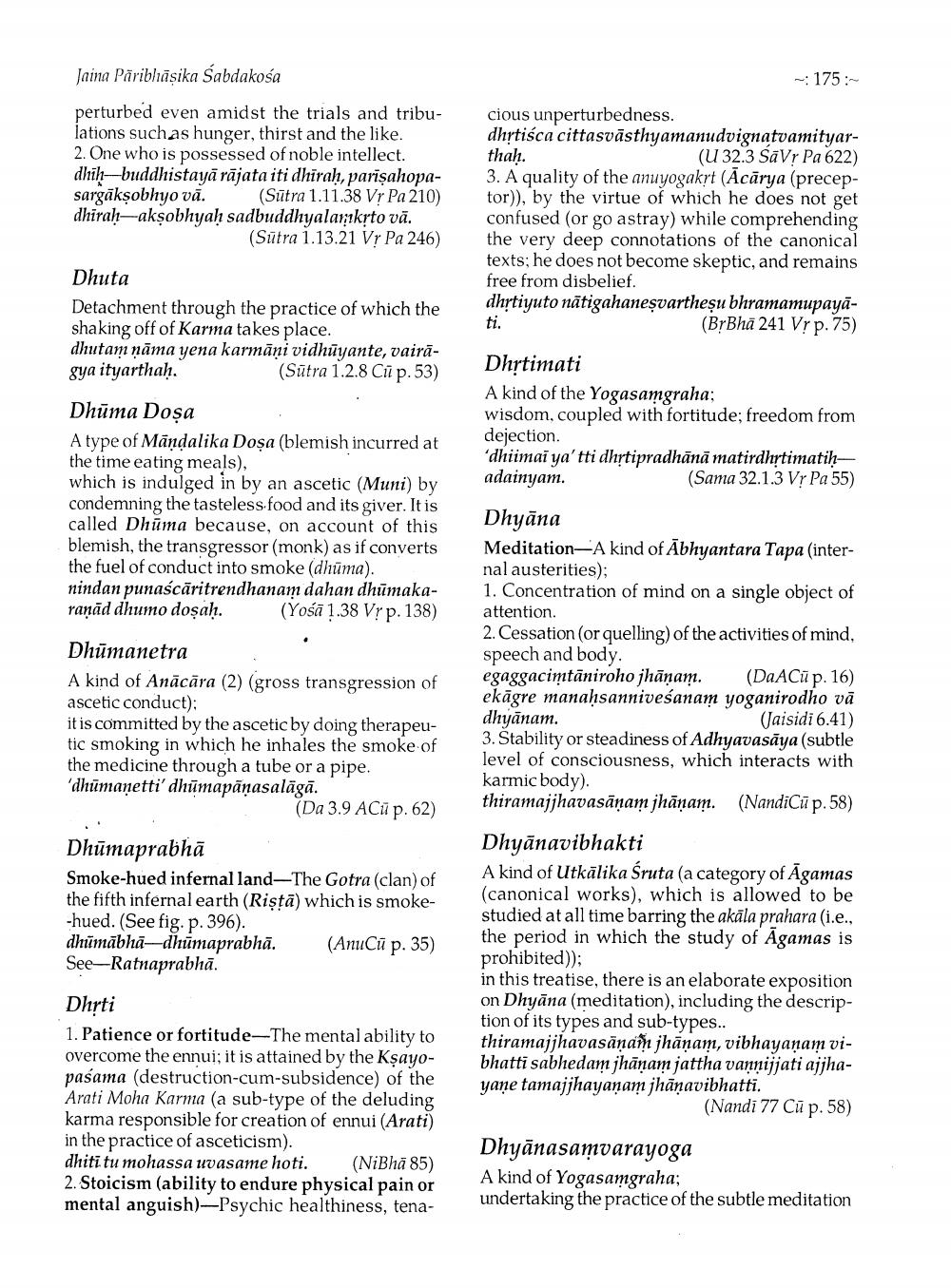________________
Jaina Paribhasika Sabdakosa
perturbed even amidst the trials and tribulations such as hunger, thirst and the like. 2. One who is possessed of noble intellect. dhih-buddhistaya rajata iti dhirah, pariṣahopasargākṣobhyo vā. (Satra 1.11.38 Vr Pa 210) dhirah akşobhyaḥ sadbuddhyalankṛto vā (Sutra 1.13.21 Vr Pa 246)
Dhuta
Detachment through the practice of which the shaking off of Karma takes place.
dhutam nama yena karmāņi vidhūyante, vairā gya ityarthah. (Satra 1.2.8 Ci p.53)
Dhuma Dosa
A type of Mandalika Dosa (blemish incurred at the time eating meals),
which is indulged in by an ascetic (Muni) by condemning the tasteless-food and its giver. It is called Dhuma because, on account of this blemish, the transgressor (monk) as if converts the fuel of conduct into smoke (dhama). nindan punaścäritrendhanam dahan dhumakaraṇad dhumo dosah. (Yosa 1.38 Vrp. 138)
Dhümanetra
A kind of Anācāra (2) (gross transgression of ascetic conduct);
it is committed by the ascetic by doing therapeutic smoking in which he inhales the smoke of the medicine through a tube or a pipe. 'dhumanetti' dhümapäṇasalāgā.
(Da 3.9 ACA p. 62)
Dhimaprabha
Smoke-hued infernal land-The Gotra (clan) of the fifth infernal earth (Ristä) which is smoke-hued. (See fig. p. 396). dhumabhadhimaprabha. See-Ratnaprabhā.
(AnuCap. 35)
Dhrti
1. Patience or fortitude-The mental ability to overcome the ennui; it is attained by the Kṣayopasama (destruction-cum-subsidence) of the Arati Moha Karma (a sub-type of the deluding karma responsible for creation of ennui (Arati) in the practice of asceticism). dhiti tu mohassa uvasame hoti. (NiBha 85) 2. Stoicism (ability to endure physical pain or mental anguish)-Psychic healthiness, tena
~175~
cious unperturbedness. dhṛtisca cittasvasthyamanudvignatvamityarthaḥ. (U 32.3 SaVr Pa 622)
3. A quality of the anayogakṛt (Acarya (preceptor)), by the virtue of which he does not get confused (or go astray) while comprehending the very deep connotations of the canonical texts; he does not become skeptic, and remains free from disbelief.
dhṛtiyuto nätigahanesvartheşu bhramamupayā(BrBha 241 Vrp. 75)
ti.
Dhṛtimati
A kind of the Yogasamgraha;
wisdom, coupled with fortitude; freedom from dejection.
'dhiimai ya' tti dhṛtipradhänä matirdhṛtimati adainyam. (Sama 32.1.3 Vr Pa 55)
Dhyana
Meditation-A kind of Abhyantara Tapa (internal austerities):
1. Concentration of mind on a single object of
attention.
2. Cessation (or quelling) of the activities of mind. speech and body.
egaggacintaniroho jhanam. (DaACî p. 16) ekagre manahsanniveśanam yoganirodho va dhyānam. (Jaisidi 6.41)
3. Stability or steadiness of Adhyavasaya (subtle level of consciousness, which interacts with karmic body). thiramajjhavasanam jhänam. (Nandicap.58)
Dhyanavibhakti
A kind of Utkälika Śruta (a category of Agamas (canonical works), which is allowed to be studied at all time barring the akala prahara (i.e.. the period in which the study of Agamas is prohibited));
in this treatise, there is an elaborate exposition on Dhyana (meditation), including the description of its types and sub-types.. thiramajjhavasanam jhanam, vibhayanam vibhatti sabhedam jhanam jattha vannijjati ajjhayane tamajjhayaṇam jhaṇavibhatti.
(Nandi 77 Cap. 58)
Dhyanasamvarayoga
A kind of Yogasamgraha;
undertaking the practice of the subtle meditation




